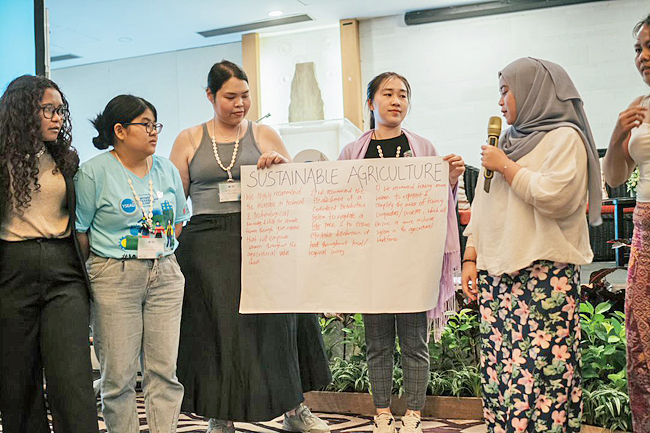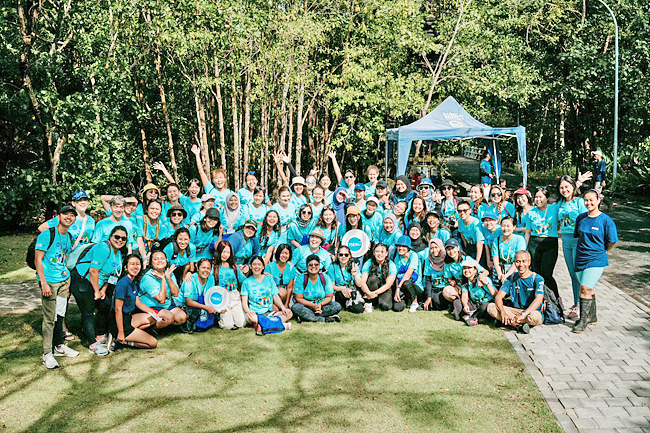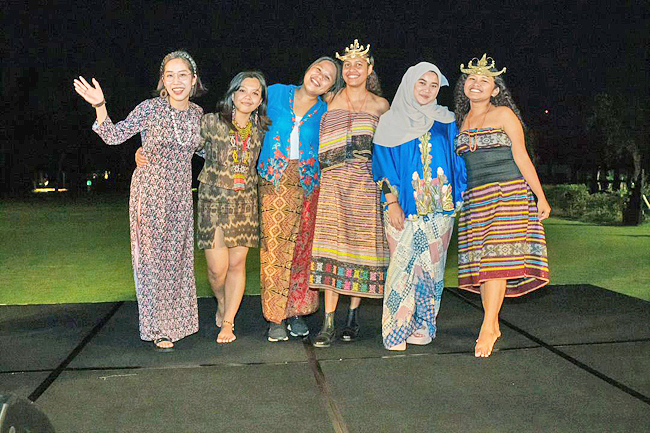As the global urban population continues to grow, Asia remains the region with the largest percentage of the world’s urban population. However, Southeast Asia stands out as the most vulnerable and at-risk region affected by climate change, experiencing extreme rainstorms, droughts, and rising sea levels surpassing the global average.
These consequences can be attributed to ongoing deforestation, industrialisation, and rapid urbanisation, leading to pollution, increased greenhouse gas emissions, global warming, and higher demands for consumption and lifestyle changes.
Nevertheless, there is hope in the form of urban gardening, which can help address the social and environmental challenges posed by climate change. By leveraging innovative technologies and implementing high-energy efficient infrastructure and buildings, cities can reduce their carbon footprint and foster sustainable development.
This is what the founder and Managing Director of Kilang ReRoot Hajah Siti Norfarwizah binti Haji Mohd Ja’afar aspires to incorporate into her social enterprise following her participation in the United States (US) government’s Young Southeast Asian Leaders initiative (YSEALI) Women Leadership Academy (WLA).
Focusing on food waste management, food consumption, production and waste recovery in Brunei, Hajah Siti Norfarwizah was chosen by the US Embassy in Brunei Darussalam to take part in the YSEALI WLA in Bali, Indonesia from May 1 to 6 as one of the Brunei delegates to represent her organisation.



An aspiring young female agripreneur, the social enterpriser sets her sights on expanding her knowledge on gender issues, climate change and environmental impacts on the food and agriculture sector.
She said the programme in Bali gave her the opportunity to experience just that as it led her to create an on-going collaborative project with her Vietnamese colleagues from The Green Dots Vietnam.
“The project comes under an umbrella project called the ‘Southeast Asia Seeds (SEAds) Living Labs’,” shared Hajah Siti Norfarwizah.
Sponsored by the Alumni Engagement Innovation Fund (AEIF) programme, SEAds Living Labs is a project dedicated to creating positive change, aims to transform the community’s lifestyle by raising awareness of healthy living practices, establishing more natural green spaces, and promoting a circular economy approach to eliminate food waste and loss.
The project focuses on urban development and architectural landscapes that cultivate social, economic, and environmental benefits, thereby mitigating the impacts of climate change in urban areas.
To achieve this vision, SEAds Living Labs is piloting two initiatives, ‘The Balkony Project’ in Brunei and ‘A Circular Community Garden’ in Ho Chi Minh, Vietnam.
The projects serve as examples of creating a greener future by introducing urban gardening practices and emphasising sustainability in urban areas.
Through these initiatives, SEAds Living Labs hopes to contribute to the development of sustainable cities that prioritise environmental conservation and address the challenges brought by climate change.
“This project aims to raise awareness and involvement in the circular economy, urban agriculture, and food security by having urban citizens participate in our engagement activities, competitions, virtual and in-person workshops, sharing sessions, and cultural exchange events between intercultural communities among US-ASEAN countries.”
Through combining theory of knowledge sessions and practical workshops to promote community practices and awareness for sustainable and engaging experiences, Hajah Siti Norfarwizah noted the focuses of the project looking at addressing climate change through urban farming and circular practices.
Benefiting green areas in cities, improving overall health and wellness, and contributing to family food security, she believes that the project will also be able to accelerate community-based projects for community gardens in both countries.
“This project will begin with an individual-scale balcony or backyard garden in Brunei 2022-23, and a community scale community garden in Vietnam 2022-23.
“With the support and cooperation from The Green Dots Vietnam that has managed to work on their individual scale projects of gardens in 2021, the collaborative project model can refine and replicate existing activities between Southeast Asian countries, hence SEAds Living Labs.”
With the insights and networking gained from YSEALI WLA in Bali, Indonesia, Hajah Siti Norfarwizah said she is able to bring home another grant-worthy project led by her project team from across five ASEAN countries called the ‘Green Women Farmers’ project, focusing on solving poverty, food insecurity and plastic waste.
She added that this project has also enabled the local social enterprise to expand its potential as a young organisation in food waste management and sustainable agriculture through coming up with solutions to increase income via providing training on sustainable agriculture by incorporating waste management knowledge.
The targeted population for this project are vulnerable women groups from various communities, including the indigenous, single mothers, low income and rural people in Timor-Leste, Malaysia and the Philippines.
She and her team were also involved in a clean-up of a mangrove area that turned into a hands-on learning session for her team from Bali-based Sungai Watch as they collected over 700 kilogrammes of trash during the volunteering work.
Hajah Siti Norfarwizah expressed her gratitude to the US Embassy on choosing her to represent Brunei at the WLA.
The US-ASEAN YSEALI WLA is a workshop for emerging women leaders and advocates. This year’s theme was on climate crisis and challenges in environment, ecology, energy and equity.
YSEALI is the US State Department’s flagship youth exchange programme focusing on Southeast Asia. Since its establishment in 2013, the US government has said that it is key to the US socio-cultural partnership with ASEAN and builds bridges between young leaders and the US. – Rizal Faisal


